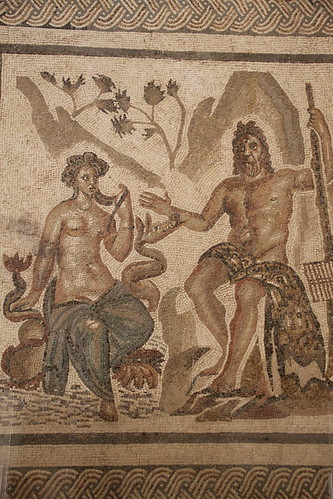Fragment of wall painting depicting the Cyclop Polyphemus and the Nymph Galatea sensously kissing in the arms of each other. Pompeii, House of the Colored Capitals (VII, 4, 48), room 15, south wall.
In Handel's Acis and Galatea Polyphemus' oafish attempts to seduce Galatea are rejected as she shuns his warm embraces and frankly informs him she has no wish to share his feasts of infant limbs and draughts of human blood.
But the issue becomes complicated when reading Ovid's version in Book XIII of the Metamorphoses where Galatea recounts from memory Polyphemus' love song rendered in a total of 80 lines of poetry compared to the puny two lines given to Acis in his final cries for help before being crushed under a rock. Galatea, supposedly enamoured in heart, soul and mind with Acis, doesn't convince.
In fact, Handel's version, with text by John Gay and others, presents a rather archetypal depiction of his characters: Galatea and Acis are both sweet and taintless inhabitants of an ideal pastoral world, who enter into conflict with the brutal and uncouth, if not comical, lout Polyphemus, the ultimate representation of a destructive force born on the wings of jealousy: all the trappings of a 'modern' fairy tale in the Grimm Brothers' style. In contrast, the world of Ovid and the ancient Greek and Roman gods is another matter, and what captivates is the degree of humanity in the ranks of the deities: virtues go hand in hand with vices, there are no apologies for shortcomings and imperfections, the ways of the gods remain out of the realms of mortal criticism.
Digging deeper into the story of Galatea (daughter of Nereus) and Polyphemus (son of Poseidon), we discover that the poet Philoxenus of Kythera (5th century B.C.) could not think of the reason for the shrine built by Poylphemus and dedicated to Galatea near Mount Etna and so he invented the tale that Polyphemus was in love with Galatea.
Slightly earlier in the 5th Century, Bacchylides testifies that Polyphemus not only loved Galatea, but he also fathered a son Galatos by her.
So, a little gossip that sheds another light on why Galatea remembers Polyphemus' lengthy love-song in Ovid and gives insight to the possible interpretations of the Galatea - Polyphemus duet scene in Handel. Although she laughs at him, scorns him and ultimately rejects him, it's very likely that she, the beautiful nymph with the milk-white complexion, was in fact, in some corner of her heart and mind, deeply attracted to the masculine bristle, the raw muscular brutishness and the crude rural verses of Polyphemus.
|

